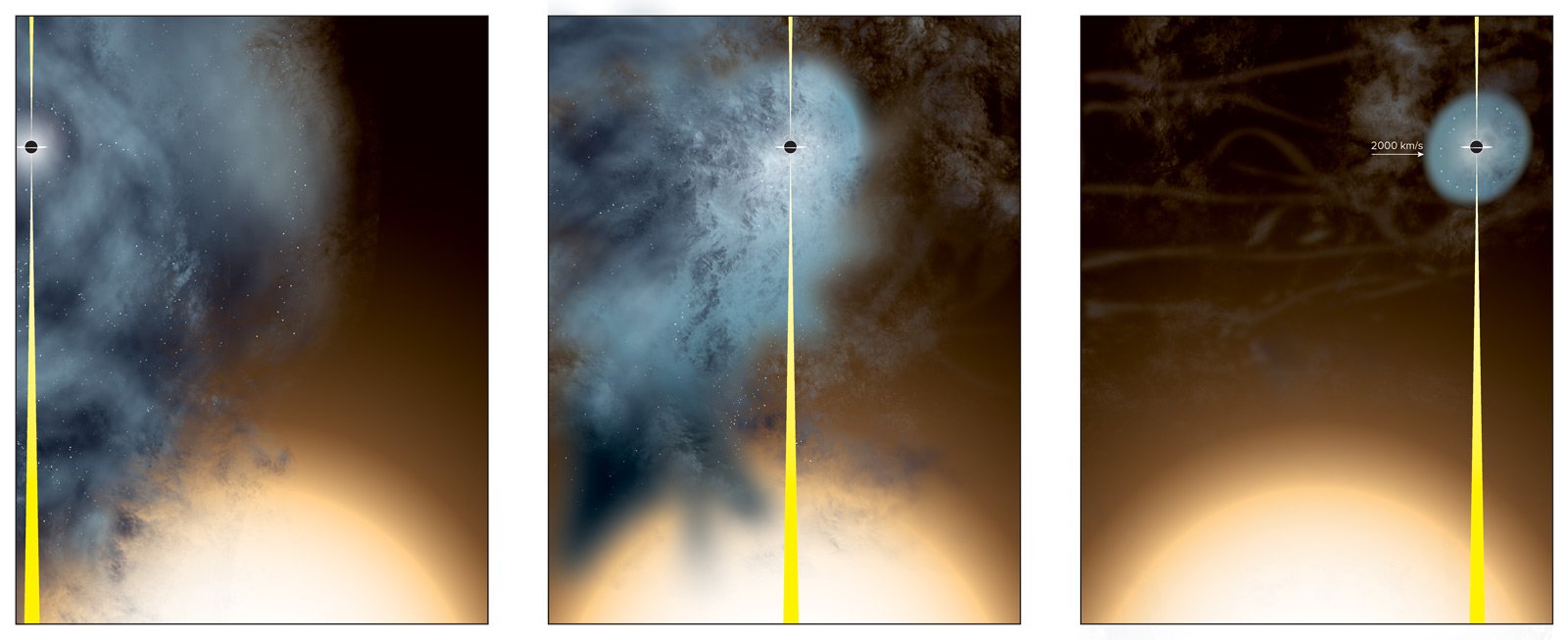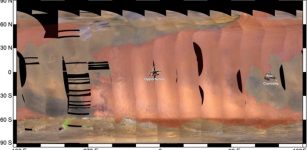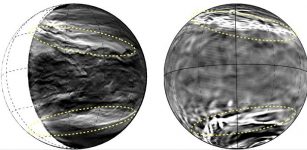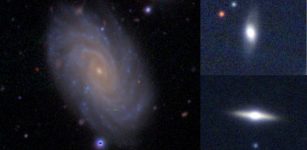Peculiar “Nearly Naked” Supermassive Black Hole Fleeing From Larger Galaxy – Discovered
MessageToEagle.com – Astronomers from the National Radio Astronomy Observatory discovered the shredded remains of a galaxy that passed through a larger galaxy, leaving only the smaller galaxy’s nearly-naked supermassive black hole to emerge and speed away at more than 2,000 miles per second.

The fascinating discovery was made when astronomers used National Science Foundation’s Very Long Baseline Array (VLBA) known to have super-sharp radio vision, to detect supermassive black holes, millions or billions of times more massive than the Sun, that are not at the centers of galaxies.
“We were looking for orbiting pairs of supermassive black holes, with one offset from the center of a galaxy, as telltale evidence of a previous galaxy merger. Instead, we found this black hole fleeing from the larger galaxy and leaving a trail of debris behind it,” U.S. National Radio Astronomy Observatory’s James Condon — the lead author of a study detailing the observations — said in a statement released by NRAO.
“We’ve not seen anything like this before.”
See also:
Wandering Black Hole Found 4.5 Billion Light Years From Earth
Monster Black Holes 10 Billion Times Greater Than The Sun
Super Massive Black Holes Lurking In The Hearts Of Galaxies
Located in a galaxy cluster called ZwCl 8193, approximately two billion light years away, the object called B3 1715+425, was probably formed when a large galaxy collided with a smaller one millions of years ago. This celestial event stripped the latter of nearly all its stars and gas.
Astronomer Jim Condon explains the discovery and significance of B3 1715+425, a “nearly naked” supermassive black hole.
What remains is its black hole and a small galactic remnant only about 3,000 light-years across. (Remember: our Milky Way Galaxy is approximately 100,000 light-years across.)
Additionally, this object is speeding away from the core of a much larger galaxy, leaving a wake of ionized gas behind it.
The speeding object will lose more and more mass and eventually cease forming new stars.
With the VLBA, astronomers will observe and discover many more objects similar to the fascinating and peculiar B3 1714+425.
MessageToEagle.com









![127 18 Share Email Home Astronomy & Space Astronomy FEBRUARY 28, 2022 Kilonova afterglow potentially spotted for first time by Amanda Morris, Northwestern University An artist’s conception illustrates the aftermath of a 'kilonova,' a powerful event that happens when two neutron stars merge. Credit: NASA/CXC/M. Weiss For the first time, Northwestern University-led astronomers may have detected an afterglow from a kilonova. A kilonova occurs when two neutron stars—some of the densest objects in the universe—merge to create a blast 1,000 times brighter than a classical nova. In this case, a narrow, off-axis jet of high-energy particles accompanied the merger event, dubbed GW170817. Three-and-a-half years after the merger, the jet faded away, revealing a new source of mysterious X-rays. As the leading explanation for the new X-ray source, astrophysicists believe expanding debris from the merger generated a shock—similar to the sonic boom from a supersonic plane. This shock then heated surrounding materials, which generated X-ray emissions, known as a kilonova afterglow. An alternative explanation is materials falling toward a black hole—formed as a result of the neutron star merger—caused the X-rays. Either scenario would be a first for the field. The study was published today (Feb. 28), in The Astrophysical Journal Letters. "We have entered uncharted territory here in studying the aftermath of a neutron star merger," said Northwestern's Aprajita Hajela, who led the new study. "We are looking at something new and extraordinary for the very first time. This gives us an opportunity to study and understand new physical processes, which have not before been observed." Hajela is a graduate student at Northwestern's Center for Interdisciplinary Exploration and Research in Astrophysics (CIERA) and in the Department of Physics and Astronomy in the Weinberg College of Arts and Sciences. On Aug. 17, 2017, GW170817 made history as the first neutron-star merger detected by both gravitational waves and electromagnetic radiation (or light). Since then, astronomers have been using telescopes around the world and in space to study the event across the electromagnetic spectrum. Using NASA's Chandra X-ray Observatory, astronomers observed X-ray emissions from a jet moving very close to the speed of light produced by the neutron star merger. Starting in early 2018, the jet's X-ray emission steadily faded as the jet continued to slow and expand. Hajela and her team then noticed from March 2020 until the end of 2020, the decline in brightness stopped, and the X-ray emission was approximately constant in brightness. This was a significant clue. "The fact that the X-rays stopped fading quickly was our best evidence yet that something in addition to a jet is being detected in X-rays in this source," said Raffaella Margutti, astrophysicist at the University of California at Berkeley and a senior author of the study. "A completely different source of X-rays appears to be needed to explain what we're seeing." The researchers believe a kilonova afterglow or black hole are likely behind the X-rays. Neither scenario has ever before been observed. "This would either be the first time we've seen a kilonova afterglow or the first time we've seen material falling onto a black hole after a neutron star merger," said study co-author Joe Bright, also from the University of California at Berkeley. "Either outcome would be extremely exciting." To distinguish between the two explanations, astronomers will keep monitoring GW170817 in X-rays and radio waves. If it is a kilonova afterglow, the X-ray and radio emissions are expected to get brighter over the next few months or years. If the explanation involves matter falling onto a newly formed black hole, then the X-ray output should stay steady or decline rapidly, and no radio emission will be detected over time. "Further study of GW170817 could have far-reaching implications," said study co-author Kate Alexander, a CIERA postdoctoral fellow at Northwestern. "The detection of a kilonova afterglow would imply that the merger did not immediately produce a black hole. Alternatively, this object may offer astronomers a chance to study how matter falls onto a black hole a few years after its birth." Explore further Astronomers find x-rays lingering years after landmark neutron star collision More information: The emergence of a new source of X-rays from the binary neutron star merger GW170817, arXiv:2104.02070 [astro-ph.HE] arxiv.org/abs/2104.02070 Journal information: Astrophysical Journal Letters , Astrophysical Journal Provided by Northwestern University Facebook Twitter Email Feedback to editors Featured Last Comments Popular Commercial floor cleaners found to produce as much aerosol pollution particles as public roads 6 HOURS AGO 0 New brown dwarf discovered with TESS 7 HOURS AGO 0 Bitcoin carbon emissions rise as mining moves to US and other countries 7 HOURS AGO 4 Experimental evidence for long-distance electrodynamic intermolecular forces 7 HOURS AGO 0 3D micromesh-based hybrid printing for microtissue engineering FEB 25, 2022 0 Ancient oxygen levels provide clues to the timing of life and death on Earth 50 MINUTES AGO Climate change is causing high tree mortality in southern Amazon 52 MINUTES AGO Scaling laws in enzymes may help predict life 'as we don't know it' 53 MINUTES AGO Plastic labeling needs 'sustainability scale,' says new report 1 HOUR AGO Snail competition leads to fewer parasites that cause schistosomiasis 2 HOURS AGO Overlooked channels influence water flow and flooding along Gulf Coast 2 HOURS AGO Under pressure: A new theory helps predict when soft materials will fail 2 HOURS AGO Relevant PhysicsForums posts Standard way of expressing 'no proof given'? 1 HOUR AGO Really worried about the Ukraine 1 HOUR AGO Not getting anything in this subject Information system-: 1 HOUR AGO Is getting a Master's degree in physics worth it? 1 HOUR AGO Special Relativity violation via Quantum Mechanics? 1 HOUR AGO Kinematics - can't find the initial velocity according to the image 1 HOUR AGO More from Physics Forums | Science Articles, Homework Help, Discussion 1 2 Medical Xpress Medical research advances and health news Tech Xplore The latest engineering, electronics and technology advances Science X The most comprehensive sci-tech news coverage on the web Newsletters Email Science X Daily and the Weekly Email Newsletter are free features that allow you to receive your favorite sci-tech news updates in your email inbox Follow us Top Home Search Mobile version Help FAQ About Contact Science X Account Sponsored Account Archive News wire Android app iOS app RSS feeds Push notification © Phys.org 2003 - 2022 powered by Science X Network Privacy policy Terms of use 1 / 1An artist’s conception illustrates the aftermath of a 'kilonova,' a powerful event that happens when two neutron stars merge. Credit: NASA/CXC/M. Weiss](https://www.messagetoeagle.com/wp-content/uploads/2022/02/kilonova11-307x150.jpg)
